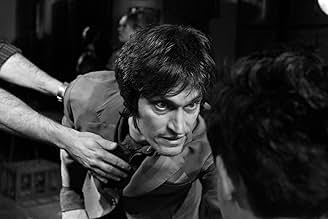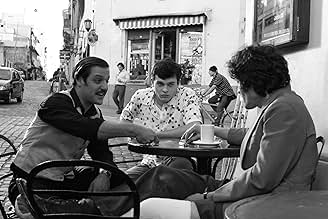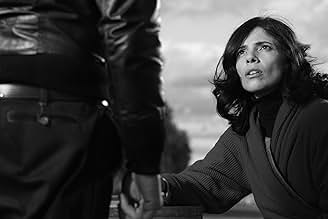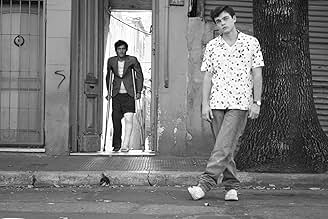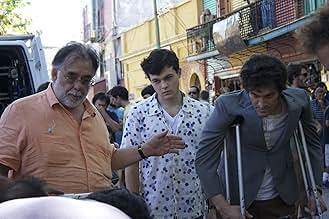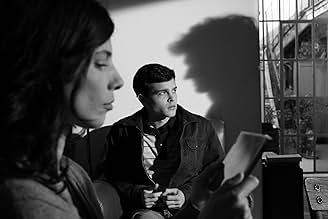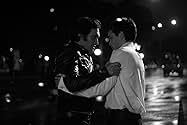Tetro
- 2009
- Tous publics
- 2h 7m
IMDb RATING
6.8/10
14K
YOUR RATING
Bennie travels to Buenos Aires to find his long-missing older brother, a once-promising writer who is now a remnant of his former self. Bennie's discovery of his brother's near-finished play... Read allBennie travels to Buenos Aires to find his long-missing older brother, a once-promising writer who is now a remnant of his former self. Bennie's discovery of his brother's near-finished play might hold the answer to understanding their shared past and renewing their bond.Bennie travels to Buenos Aires to find his long-missing older brother, a once-promising writer who is now a remnant of his former self. Bennie's discovery of his brother's near-finished play might hold the answer to understanding their shared past and renewing their bond.
- Director
- Writers
- Stars
- Awards
- 1 win & 6 nominations total
Rodrigo de la Serna
- José
- (as Rodrigo De La Serna)
Erica Rivas
- Ana
- (as Érica Rivas)
Sofía Gala Castiglione
- María Luisa
- (as Sofía Castiglione)
- Director
- Writers
- All cast & crew
- Production, box office & more at IMDbPro
Featured reviews
The week of his 18th birthday , Bennie (Alden Ehrenreich fim debut) travels to Buenos Aires to find his long-missing older brother . As he seeks out his older brother, the washed-out and disturbed Tetro (George Gallo) , whom he hasn't seen in years. Tetro lives with Miranda, (Maribel Verdú) a happy and always glad woman . He's introducing him as a "friend," refusing Tetro to talk about their family and some thoughts of their nasty dad cast a shadow over both brothers . But every family has a secret and every family has a past . Along the way Bennie's discovery of his worn-out brother's near-finished play might hold the answer to understanding their shared past and renewing their bond .
This an unsettling and interesting film , an intense drama concerning what past has Tetro left behind , being full of emotion , touching scenes , good feeling , marvellous dances inspired by The Hoffman Tales , The Red shoes by Michael Powell/ Emeric Pressburger and a final twist . It is a simple , dramatic and intelligent portrait of two people , focused on brothership , and sibling rivalry which a dark secret will forever change the family's fate . This is an uplifting movie at times , too , not just a tear-jerker or horrific in showing two sibling's suffering , as they attempt to regain the dignity they lost after years spent without seeing . The picture is developed in slow-moving but is pretty well realized . The flick stands out for its melancholy and poignant multilevel exploration of alienation , past records and despair . The story has a certain melancholic style , a climate of transience and sadness that spread the dispute between the two protagonists brothers . Visually it transports one into a dark, grey , nightmarish world but enriched by some colorful images thanks to some flasblacks well photographed by Mihai Malaimare Jr. , these images were shot in colour , but treated to give a slightly faded texture. The screenplay by Coppola himself , acting, direction all come together to create this extraordinary viewing experience . George Gallo gives a nice acting as the burnt-out Tetro , once-promising writer who is now a remnant of his former self , and he is is hot and cold toward his brother . His sibling is finely played by Alden Ehrenreich at his film debut as Bennie, a waiter on a cruise ship who has a layover in Buenos Aires to meet again his brother and subsequently he finds pages of Tetro's unfinished novel, then he pushes both to know his own history and to become a part of his life . Support cast is pretty good with several Argentina/Spain actors such as Maribel Verdú , Carmen Maura , Rodrigo De la Serna , Silvia Pérez , Erica Rivas , Leticia Brédice and special mention for Klaus Maria Brandauer as father .
The motion picture was compellingly directed by Francis Ford Coppola , though far from his greatest successes . Coppola explained that this one was a very "personal" project , being the kind of film he set out to make as a young man, before he was sidetracked by fame , fortune and sucessful boxoffice. Coppola's film The Godfather (1972) became one of the highest-grossing movies in history and brought him an Oscar for writing the screenplay with Mario Puzo The film was a Best Picture Academy Award-winner, and also brought Coppola a Best Director Oscar nomination. Following his work on the screenplay for The Great Gastby (1974), Coppola's next film was The conversation (1974), which was honored with the Golden Palm Award at the Cannes Film Festival, and brought Coppola Best Picture and Best Original Screenplay Oscar nominations. Also released that year, The Godfather: II (1974) , rivaled the big hit of The Godfather (1972) , and won six Academy Awards, bringing Coppola Academy Awards as a producer, director and writer. Coppola then began work on his most important film, Apocalypse Now (1979), a Vietnam War epic that was inspired by Joseph Conrad . Released in 1979, the acclaimed film won a Golden Palm Award at the Cannes Film Festival, and two Oscars. With George Lucas, Coppola executive produced Kagemusha (1980), directed by Akira Kurosawa, and Mishima (1985), directed by Paul Schrader and based on the life and writings of Yukio Mishima . Coppola also executive produced such films as The Escape Artist (1982) , Hammett (1983) , The Black Stallion Returns (1983), Barfly (1987), The Wind (1992) , The secret garden (1993), among others .
This an unsettling and interesting film , an intense drama concerning what past has Tetro left behind , being full of emotion , touching scenes , good feeling , marvellous dances inspired by The Hoffman Tales , The Red shoes by Michael Powell/ Emeric Pressburger and a final twist . It is a simple , dramatic and intelligent portrait of two people , focused on brothership , and sibling rivalry which a dark secret will forever change the family's fate . This is an uplifting movie at times , too , not just a tear-jerker or horrific in showing two sibling's suffering , as they attempt to regain the dignity they lost after years spent without seeing . The picture is developed in slow-moving but is pretty well realized . The flick stands out for its melancholy and poignant multilevel exploration of alienation , past records and despair . The story has a certain melancholic style , a climate of transience and sadness that spread the dispute between the two protagonists brothers . Visually it transports one into a dark, grey , nightmarish world but enriched by some colorful images thanks to some flasblacks well photographed by Mihai Malaimare Jr. , these images were shot in colour , but treated to give a slightly faded texture. The screenplay by Coppola himself , acting, direction all come together to create this extraordinary viewing experience . George Gallo gives a nice acting as the burnt-out Tetro , once-promising writer who is now a remnant of his former self , and he is is hot and cold toward his brother . His sibling is finely played by Alden Ehrenreich at his film debut as Bennie, a waiter on a cruise ship who has a layover in Buenos Aires to meet again his brother and subsequently he finds pages of Tetro's unfinished novel, then he pushes both to know his own history and to become a part of his life . Support cast is pretty good with several Argentina/Spain actors such as Maribel Verdú , Carmen Maura , Rodrigo De la Serna , Silvia Pérez , Erica Rivas , Leticia Brédice and special mention for Klaus Maria Brandauer as father .
The motion picture was compellingly directed by Francis Ford Coppola , though far from his greatest successes . Coppola explained that this one was a very "personal" project , being the kind of film he set out to make as a young man, before he was sidetracked by fame , fortune and sucessful boxoffice. Coppola's film The Godfather (1972) became one of the highest-grossing movies in history and brought him an Oscar for writing the screenplay with Mario Puzo The film was a Best Picture Academy Award-winner, and also brought Coppola a Best Director Oscar nomination. Following his work on the screenplay for The Great Gastby (1974), Coppola's next film was The conversation (1974), which was honored with the Golden Palm Award at the Cannes Film Festival, and brought Coppola Best Picture and Best Original Screenplay Oscar nominations. Also released that year, The Godfather: II (1974) , rivaled the big hit of The Godfather (1972) , and won six Academy Awards, bringing Coppola Academy Awards as a producer, director and writer. Coppola then began work on his most important film, Apocalypse Now (1979), a Vietnam War epic that was inspired by Joseph Conrad . Released in 1979, the acclaimed film won a Golden Palm Award at the Cannes Film Festival, and two Oscars. With George Lucas, Coppola executive produced Kagemusha (1980), directed by Akira Kurosawa, and Mishima (1985), directed by Paul Schrader and based on the life and writings of Yukio Mishima . Coppola also executive produced such films as The Escape Artist (1982) , Hammett (1983) , The Black Stallion Returns (1983), Barfly (1987), The Wind (1992) , The secret garden (1993), among others .
Enthralling, captivating. Buenos Aires, maybe? Black and White scope mostly, the limpid soul and devastating smile of Alden Ehrenreich. Coppola enjoys his freedom and so do we. At the base of it all, a juicy melodrama but the master flies over it with a tireless, youthful zest. Vincent Gallo seem a bit of an odd choice to play the title role and in fact I just found out that Matt Dillon was supposed to have played it. It certainly would have added up the romanticism and the sensuality that runs through it but, never mind. Alden Ehrenreich as Bennie is, quite simply, fantastic. Maribel Verdu another stand out as Tetro's loving if long suffering companion. Karl Maria Brandauer is horribly perfect, a character that emanates the kind of debauchery fame and rotten ego can provide. "There is room for just one genius in this family" I saw the film last night and it hasn't left me for a moment. I can't wait to see it again.
After a career that has consisted of the "Godfather" movies, "Apocalypse Now", "The Outsiders", Bram Stoker's "Dracula" and "Youth without Youth" - to name just a few - where would Francis Ford Coppola go next? He directed "Tetro", about the secret history of an Italian-Argentinian family.
Benjamin Tetrocini (Alden Ehrenreich) arrives in Buenos Aires and goes to visit his brother Angelo (Vincent Gallo). The embittered Angelo is now going by the name Tetro. As the movie progresses, a series of important topics about the family gets revealed, and how it has always affected the relationship between the two brothers.
Coppola uses one of the most unusual devices to tell the story. The present is filmed in stark black-and-white, while the past is shown in a slightly grainy color. It's as if the past was supposedly apparent - to show that the characters thought that they knew everything that was going on - while the present is supposedly unclear (to show that there are things to be discovered). I read that the movie pays homage to "The Tales of Hoffman", but I don't know that one, so I have to take the movie at face value. And what I saw certainly impressed me. I definitely recommend this movie.
Also starring Maribel Verdú, Carmen Maura, Klaus Maria Brandauer, and Rodrigo de la Serna (who co-starred in "The Motorcycle Diaries" and is a relative of Che Guevara).
Benjamin Tetrocini (Alden Ehrenreich) arrives in Buenos Aires and goes to visit his brother Angelo (Vincent Gallo). The embittered Angelo is now going by the name Tetro. As the movie progresses, a series of important topics about the family gets revealed, and how it has always affected the relationship between the two brothers.
Coppola uses one of the most unusual devices to tell the story. The present is filmed in stark black-and-white, while the past is shown in a slightly grainy color. It's as if the past was supposedly apparent - to show that the characters thought that they knew everything that was going on - while the present is supposedly unclear (to show that there are things to be discovered). I read that the movie pays homage to "The Tales of Hoffman", but I don't know that one, so I have to take the movie at face value. And what I saw certainly impressed me. I definitely recommend this movie.
Also starring Maribel Verdú, Carmen Maura, Klaus Maria Brandauer, and Rodrigo de la Serna (who co-starred in "The Motorcycle Diaries" and is a relative of Che Guevara).
17 year-old Bennie works as a waiter on a cruiseship. When the ship suffers engine difficulties and docks in Buenos Aires, he uses the opportunity to attempt to reconnect with his estranged brother Tetro, a once promising writer. He is welcomed with open arms by Tetro's girlfriend, Miranda. She longs to know the truth behind her boyfriends past and what made him the misanthrope he is today. Tetro is hostile towards his brother, his plan was to never see any of his family again, and so keeps him at arms length. Bennie discovers an incomplete play, written in code whilst his brother was undergoing psychiatric treatment. He decides to finish the play and enter it in a festival run by Argentina's most powerful critic, Alone. Faced with this upheaval, Tetro is forced to come to terms with his relationship to his younger brother and his father, a famous conductor.
Tetro is, at its core, a film about family, in particular the relationship between brothers and their Father. A theme Francis Ford Coppola has immersed himself in before, most notably in The Godfather and Rumble Fish. Through a series of flashbacks we are given a glimpse of major events in Tetro's youth, his relationship with his father (played by Klaus Brandauer) and his subsequent departure. There are huge family secrets known only to Tetro and revealed to Bennie in an ending which echoes great literary and operatic works. Coppolas love of opera and theater is stamped all over the script and the city of Buenos Aires seems to be the perfect background in which to set this story.
Shot stunningly in digital monochrome with colour flashbacks, it has some aesthetic similarities to Rumble Fish. Coppola and cinematographer Mihai Malaimare Jr. reportedly site On The Waterfront and La Notte as big influences on the films visual style. There are certainly elements of both here, with the film also retaining its visual sense of self. It is operatic in both its narrative and its mise-en-scene. The idea of cutting between colour and monochrome as well as changing aspect ratios sounds as if it would be jarring, and it typically is. But for the purposes of Tetro it works perfectly.
Seen as a controversial choice by some, Vincent Gallo brings an edge to the titular character that some other actors may have lacked. However it is newcomer Alden Ehrenreich who steals the show as Bennie, a wayward teenager looking for guidance and approval. Maribel Verdu, as Miranda, provides the conduit between the two in a typicaly solid performance.
Hollywood is littered with once great directors who have fallen from grace, which makes Tetro all the more remarkable as a return to form from one of the greatest, Francis Ford Coppola.
Tetro is, at its core, a film about family, in particular the relationship between brothers and their Father. A theme Francis Ford Coppola has immersed himself in before, most notably in The Godfather and Rumble Fish. Through a series of flashbacks we are given a glimpse of major events in Tetro's youth, his relationship with his father (played by Klaus Brandauer) and his subsequent departure. There are huge family secrets known only to Tetro and revealed to Bennie in an ending which echoes great literary and operatic works. Coppolas love of opera and theater is stamped all over the script and the city of Buenos Aires seems to be the perfect background in which to set this story.
Shot stunningly in digital monochrome with colour flashbacks, it has some aesthetic similarities to Rumble Fish. Coppola and cinematographer Mihai Malaimare Jr. reportedly site On The Waterfront and La Notte as big influences on the films visual style. There are certainly elements of both here, with the film also retaining its visual sense of self. It is operatic in both its narrative and its mise-en-scene. The idea of cutting between colour and monochrome as well as changing aspect ratios sounds as if it would be jarring, and it typically is. But for the purposes of Tetro it works perfectly.
Seen as a controversial choice by some, Vincent Gallo brings an edge to the titular character that some other actors may have lacked. However it is newcomer Alden Ehrenreich who steals the show as Bennie, a wayward teenager looking for guidance and approval. Maribel Verdu, as Miranda, provides the conduit between the two in a typicaly solid performance.
Hollywood is littered with once great directors who have fallen from grace, which makes Tetro all the more remarkable as a return to form from one of the greatest, Francis Ford Coppola.
Thousand of miles away from Hollywood, the great Francis Coppola confronts something personal as a human being as well as a filmmaker. The story a young man looking for his older brother under the crippling shadow of a famous father. Hummm. Compelling, absorbing, mesmerizing at times. The younger brother is played with real magic by newcomer Alden Ehrenreich but for some inexplicable reason the older brother and title role is played by Vincent Gallo. He's an interesting guy but not at all the pivot that, clearly, the part required. I needed to feel things that Gallo didn't provide. He's just weird and even in the enormous emotional scenes (like the final one) he's not really there. I wonder why Coppola made this bizarre casting decision. The rest of the cast is fabulous and Buenos Aires breaths a life of its own even if, it didn't feel like Buenos Aires - I know that city pretty well - it looked at times like a border town in Mexico. Buenos Aires has an old fashion, seductive kind of elegance nowhere to be found here. I'm sure there is reason for it and I hope to discover it in my next viewing because this is a film I know I'll see many, many times. Another thing to cheer about, a strange and haunting score (it reminded me of "Apartment Zero" in more ways than one) and a sensational black and white Cinemascope screen. To be seen!
Did you know
- TriviaFrancis Ford Coppola claimed that this is the kind of film he set out to make as a young man, before he was sidetracked by fame and fortune.
- GoofsEarly in the movie Tetro stumbles into the kitchen with a broken leg and knocks over some furniture while lighting a cigarette using a burner on the stove. he ignites the burner by just turning the knob on the stove. A few minutes later Miranda must use a match to light a burner on the same stove-top.
- ConnectionsFeatured in At the Movies: Cannes Film Festival 2009 (2009)
- SoundtracksEl Búho
(2007) (uncredited)
Written & Performed by Lisandro Aristimuño
Courtesy of Los Años Luz Discos SRL
- How long is Tetro?Powered by Alexa
Details
- Release date
- Countries of origin
- Languages
- Also known as
- Francis Ford Coppola's Tetro
- Filming locations
- Production companies
- See more company credits at IMDbPro
Box office
- Budget
- $5,000,000 (estimated)
- Gross US & Canada
- $518,522
- Opening weekend US & Canada
- $30,504
- Jun 14, 2009
- Gross worldwide
- $2,874,474
- Runtime
- 2h 7m(127 min)
- Color
- Sound mix
- Aspect ratio
- 2.35 : 1
Contribute to this page
Suggest an edit or add missing content







